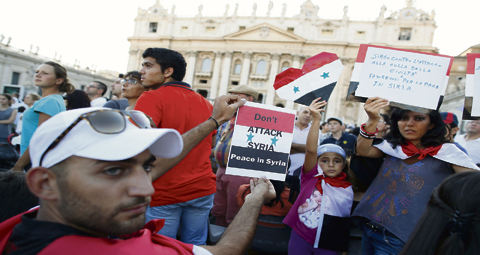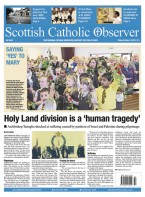September 20 | ![]() 0 COMMENTS
0 COMMENTS ![]() print
print

Strong in Faith: A weekly discussion chaired by our Catholic university chaplaincies
DISCUSSION 1: How meaningful do you think it is to fast and pray for peace in Syria?
“And when He was come into the house, His disciples asked Him privately: Why could not we cast him out? And He said unto them: This kind can come forth by nothing, but by prayer and fasting” (Mk 9: 28-29).
Our Holy Father Pope Francis clearly follows the advice of Our Lord and urges us to realise that, through prayer and fasting, miracles can be worked (Quoting my parish priest).
Jesus A Tapia Amador
Being without something makes us focus on what we should be grateful for having. In this modern world, our belief in ourselves as people is challenged every day, by the reminder of the danger to vulnerable people.
“Therefore I say to you, whatever things you ask when you pray, believe that you receive them, and you will have them” (Mark 11:24)
It is meaningful to fast and pray so as to remind ourselves not only of those suffering in Syria but those around the world that live in fear, danger and oppression. And to thank God for the gifts we have in our lives, that others do not have.
Christine Glen
I think it is just as meaningful to pray for this matter that’s making headlines, as it is to pray for peace in the Holy Land, Afghanistan, Saudi Arabia, North Korea etc. We’ll struggle to find a country in the world that isn’t wounded by hatred of natural and divine goodness.
But let’s not pray out of disgust for what we watch, rather out of confidence. Instead of vaguely praying for world peace every time we see horrific images on the news, could we not pick a world leader, an administration or the adherents to an ideology, and present them to the wisdom of the Blessed Mother? It’s very hard for us to understand the logic and intentions of our leaders sometimes, but our Mother knows what is needed. She is best disposed to ask.
Andrew McManus
DISCUSSION 2: What penance do you perform on Fridays and why?
I don’t eat any meat. Why? Because it’s still the rules, even though most people don’t seem to know it. If you don’t abstain then you are supposed to do something else instead. Also, in many parts of the world such as the US, Friday abstinence is still compulsory in Lent and there is no optional alternative.
It’s up to the priests and bishops to re-educate the laity about this (as they have recently in England). I have just spent 20 minutes or so on the internet trying to find out what specific practice the Bishops’ Conference of Scotland have decided here and I couldn’t find a thing, so perhaps it is hardly surprising that so few people have any awareness of this issue.
As well as clergy, Catholic schools are well-placed to offer guidance by amending their lunch menus accordingly. This would inform not only the pupils themselves but also their families.
Chris McLaughlin
Same as Chris’ response in every respect.
Adam Coates
If I’m being totally honest I’ve taken part in this discussion as penance! I even managed to go through the day without munching my massive pack of bacon I’ve got in the fridge (even though our Scottish Bishops have decided that the whole no meat Friday thing isn’t applicable to Scottish people. The Holy Spirit must have made an exception to the universal observance for the sake of our roll ‘n’ steak slice).
The reason I try to give up my meat? Crudely put: solidarity. My Lord gave up His flesh on this day. How can I share His suffering if I can’t even deny my base pleasure? Our Friday battle should be hard. His was torture.
Andrew McManus
Praying and fasting for peace is an essential tradition
By Aidan Cooke
Pope Francis’ call for a day of prayer and fasting for peace caught the imagination of the Church and much of the wider world.
It is fairly easy to understand why praying for peace would be meaningful: we humans seem so hopelessly bad at keeping peace that it must only be possible with God’s intervention. And as we all know, if we don’t ask, we won’t receive. Indeed, it is an essential part of the Church’s priestly office to intercede for the world.
At first glance, fasting for peace can appear less meaningful, but in fact, by fasting we die to our self-will and bring ourselves closer to Christ.
Often, when we ask someone a favour, we accompany our request with a gift or some meaningful action to show our sincerity. In some sense, we can see fasting as the gift that accompanies our prayers to make our pleas more acceptable; it is a sacrifice that moderates our own desires, and shows our readiness to follow God’s Will.
The Catechism states that days of penance, including each Friday of the year ‘in memory of the death of the Lord,’ are ‘particularly appropriate for…voluntary self-denial such as fasting and almsgiving, and fraternal sharing—charitable and missionary works’ (CCC 1438).
Canon law is more specific, saying that ‘abstinence from meat, or from some other food as determined by the Episcopal Conference, is to be observed on all Fridays, unless a solemnity should fall on a Friday’ (Can 1251). However, bishops’ conferences are allowed to substitute other forms of penance, which is what has been done in Scotland, the precise choice of penance being left to the individual.
In considering the precepts of the Church, the Catechism says that ‘the fourth precept—“You shall observe the days of fasting and abstinence established by the Church”—ensures the times of ascesis and penance which prepare us for the liturgical feasts and help us acquire mastery over our instincts and freedom of heart’ (CCC 2043). So Friday penance brings us closer to Christ in His sufferings, which is good in itself but also prepares us to for the Sunday celebration of His Resurrection; we must die with Christ if we are to rise with Him. It is also a regular training in suppressing our disordered desires, and helps free us for communion with God.
As the desert Fr Abba Poemen reminds us ‘We have not been taught to kill our bodies, but to kill our passions.’ In other words, bodily mortification is certainly not about damaging our bodies but about repressing the excessive desires of our self-will.
The combination of prayer and fasting limits our self-will, shows our desire to follow God’s Will and recognises our absolute need for His grace. In calling for Christians to pray and fast for peace, Pope Francis simply asked for something that should really be instinctive to us. But praying and fasting collectively can only be more effective. It is in this same spirit that the whole Church is called to do penance every Friday, and that the default penance is a common abstinence from meat.
Prayer and fasting are an inseparable part of the Church’s tradition and should be a normal part of the Christian life, as they were of the life of Christ.











